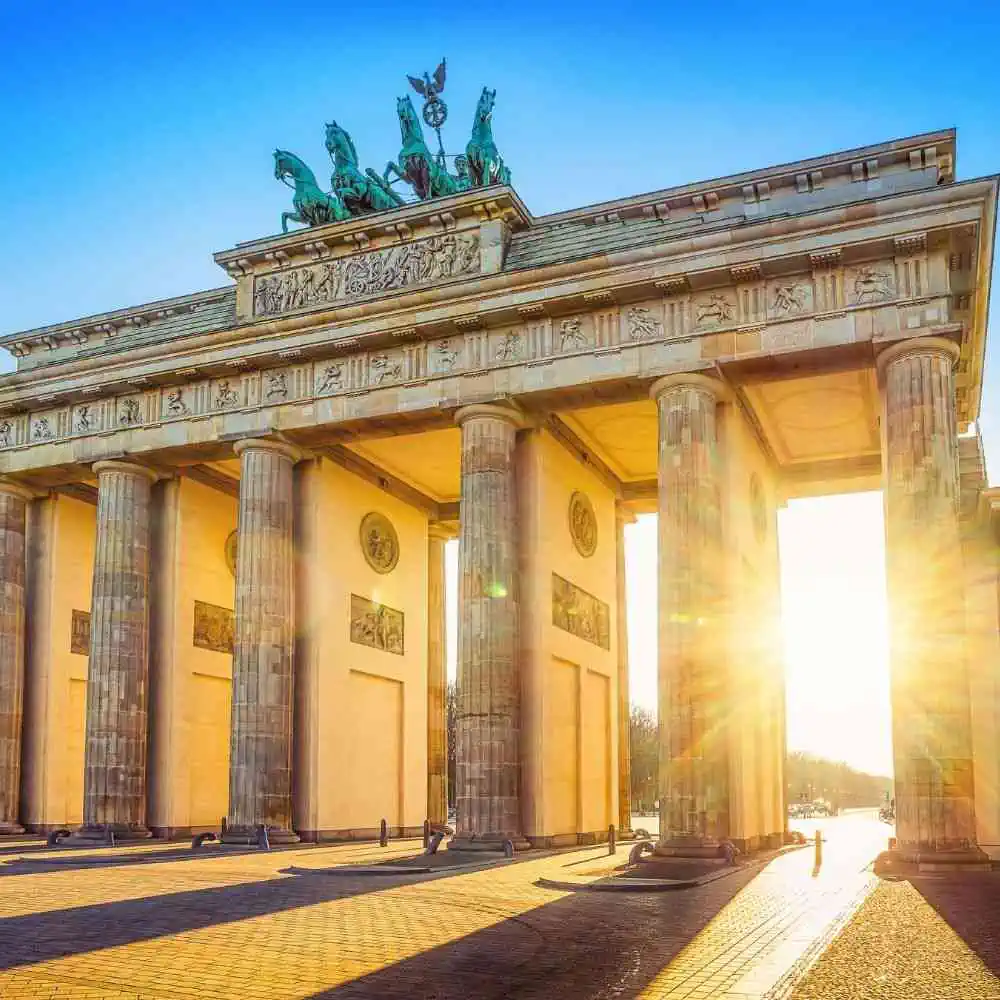Partirai da Duisburg Stazione Centrale, situata proprio nel centro della città di Duisburg, e godrai del bellissimo paesaggio del viaggio mentre arrivi a Berlino Stazione Centrale, situata anche essa nel cuore di Berlino.
Treni da Duisburg a Berlinoda € 130.00
Treni da Duisburg a Berlino
Viaggiare in treno: Duisburg - Berlino
Heading to Berlin by train from Duisburg is an immersive journey across the country, passing through some of Germany’s most iconic cities and towns. With a distance of 262 km (163 mi), it’s a comfortable five-hour train ride that goes through important stops such as Dortmund, Hannover, and Magdeburg, offering travelers an opportunity to explore each place while the train makes its way.
To make the most of the journey, start by hopping on a train from Duisburg Central and get ready to see beautiful views on your way. The train passes by some of the most scenic rivers and valleys of the region, including the Rhine, the Weser and the Elbe, all of which are landmarks in the country. Additionally, the train also stops at some of the most important cities in the region, such as Bochum, Düsseldorf, and Cottbus.
Upon arrival in Berlin Central Station, travelers can explore some of the city’s most famous attractions, like Brandenburg Gate, Fernsehturm or the Berlin Wall. To make the most of the trip, consider taking a bike tour to explore the city, checking out the graffiti art scene or trying out some of Berlin’s delicious cuisines.
The journey from Duisburg to Berlin by train provides an outstanding experience for travelers looking to explore one of the most historical cities in the world. Whether it’s discovering the culture, taking in the sights or simply enjoying the ride, the trip is sure to be a memorable one.

Dettagli del viaggio
How long does the train from Duisburg to Berlin take? The train journey from Duisburg to Berlin takes approximately 4 hours and 46 minutes.
What is the fastest journey from Duisburg to Berlin by train? The fastest journey from Duisburg to Berlin by train is 4 hours and 46 minutes.
How much does the train cost from Duisburg to Berlin? The train from Duisburg to Berlin costs around €34.60 for a one-way ticket.
How much does the Duisburg to Berlin? Yes, there is a direct train from Duisburg to Berlin.
What is the distance from Duisburg to Berlin by train? The distance from Duisburg to Berlin by train is approximately 418 Km.
Which are the cities that the train stops from Duisburg to Berlin? The train stops at stations in Lünen, Hamm, Bielefeld, Hanover, Magdeburg, Spandau, and Gesundbrunnen.
Duisburg: Luoghi da visitare
Duisburg, located in the North Rhine-Westphalian state of Germany, is a city of great historical and architectural significance that has a lot to offer tourists. From cathedrals and churches to parks and museums, you’ll find plenty of unique sites to explore. Here are the top must-visit historical and architectural sites to check out, as well as some delicious food you can try during your trip.
Duisburg Inner Harbor: A UNESCO World Heritage Site, the Duisburg Inner Harbor combines the best of industrial heritage and modern technology. The visitor center provides an insight into the area’s 19th century steamship trade, as well as the history of the harbor. The harbor is free to visit, and is open all days except Tuesdays.
Duisburg Cathedral: The Gothic cathedral of Duisburg dates back to the year 1300 and is a beautiful example of late medieval architecture. The ornate external decoration of the cathedral, including its stained glass windows, is particularly worth admiring. Admission is free and the cathedral is open from Tuesday to Sunday.
Museum Folkwang: This renowned art museum is home to a vast collection of modern art from around the world. The museum houses both permanent and temporary exhibits, with works by famous artists such as Cezanne, Klee, and Picasso. The museum is open all days except Mondays and admission is free.
Landscape Park Duisburg-Nord: Formerly a steelworks, this modern park is today a vast green space that includes a lake, hills, and a picturesque forest. The park is free to enter and is open all days. It is a perfect spot to relax and enjoy some peace and quiet in the midst of a bustling city.
Kaiserberg Park: This ornamental park is home to a lake, a castle, and a botanical garden, as well as several interesting sculptures. There is also a spectacular view of the city from the park's hill. The park is open all days and admission is free.
Sea Life Oberhausen: Located just outside the city limits, this aquarium is the largest of its kind in Germany, and is home to an impressive collection of aquatic species from around the world. It is open all days and admission fees vary according to the type of ticket purchased.
Duisburg Gourmet Market: This market is the perfect place to try some of the city’s traditional German dishes, such as bratwurst, schnitzel, and spätzle. The market also has a wide selection of drinks and desserts, making it a great place to end a day of sightseeing.
Whether you’re looking to admire the city’s historical and architectural sites, or just looking for a unique culinary experience, Duisburg has something to offer everyone. The sites included on this list represent only a fraction of what the city has to offer, and you’re sure to leave with lots of incredible memories.

Berlino: Luoghi da visitare
Berlino, la vibrante capitale della Germania, è un crogiolo di storia, cultura e architettura moderna. Con un passato tanto tumultuoso quanto affascinante, questa città offre un incredibile viaggio attraverso i secoli, ricco di monumenti emblematici e piatti tradizionali che narrano la sua storia. Scopriamo insieme gli imperdibili tesori di Berlino!
Porta di Brandeburgo: Icona di Berlino, simbolo di pace e unità, si erge maestosa al termine dell’Unter den Linden. Un tempo parte del muro di Berlino, oggi testimonia la riunificazione della città. Ubicazione: Pariser Platz.
Memoriale del Muro di Berlino: Lungo la Bernauer Straße, questo sito offre una profonda riflessione sulla divisione della città. Include frammenti del muro, la "Death Strip" e una torre di osservazione. Ubicazione: Bernauer Straße, ingresso gratuito.
Reichstag: Famoso per la sua cupola di vetro progettata da Norman Foster, che simbolizza la trasparenza politica. È possibile visitare la cupola e godere di una vista panoramica sulla città. Ubicazione: Platz der Republik 1, prenotazione gratuita ma obbligatoria.
Isola dei Musei: Patrimonio UNESCO, accoglie cinque musei di prestigio che ospitano tesori dell'arte e della storia umana. Ubicazione: Am Lustgarten, biglietto combinato disponibile per tutti i musei.
Memoriale dell'Olocausto: Composto da 2.711 blocchi di cemento di varie altezze, offre un momento di riflessione sulle vittime dell’Olocausto. Ubicazione: Cora-Berliner-Straße 1, ingresso gratuito.
East Side Gallery: Il più lungo tratto rimasto del Muro di Berlino, trasformato in una galleria a cielo aperto con opere d'arte che celebrano la libertà. Ubicazione: Mühlenstraße, ingresso libero.
Charlottenburg Palace: Un magnifico esempio dell'architettura barocca, con splendidi giardini all'inglese. Ubicazione: Spandauer Damm 20-24, biglietto d'ingresso richiesto.
Dopo aver esplorato i tesori storici e architettonici di Berlino, immergiti nella cultura culinaria locale. Non perdere il classico Currywurst, uno snack amato dai berlinesi, o siediti in una tradizionale Biergarten per gustare una Bratwurst accompagnata da una fresca pinta di birra.
Per gli amanti delle escursioni, i dintorni di Berlino offrono deliziose sorprese, come il pittoresco Potsdam con i suoi palazzi e giardini, facilmente raggiungibile in treno per una gita di un giorno. La storia, l’arte e la cultura di Berlino aspettano solo di essere scoperte, rendendo ogni angolo di questa città un capitolo indimenticabile del tuo viaggio.

Duisburg: Principali stazioni ferroviarie
Duisburg is located in Germany and has one of the largest train stations in the country, the Duisburg Hauptbahnhof. It covers all rail transport services within the city and provides direct connections to other major stations in the country such as Dusseldorf, Essen and Köln. It is also the starting point of major regional and international lines such as the InterCity Express and EuroNight.
The main station of Duisburg features an information centre with opening hours from Monday to Friday from 8:30am to 7:30pm and Saturdays from 8:30am to 2:30pm. The address of the main station is Obenmarspforten 5, 47051 Duisburg, and the contact telephone number is 49203 784-0. In addition to ticket offices and ATMs, the station also provides services for passengers such as a left luggage office, a luggage cart rental counter and a café.
- Duisburg Stazione Centrale
Berlino: Principali stazioni ferroviarie
Scoprire la rete ferroviaria di Berlino, in Germania, significa partire dalla sua stazione principale, la Hauptbahnhof, un moderno nodo di connessioni che attraversa il cuore della città. Oltre alla Hauptbahnhof, Berlino vanta altre stazioni rilevanti come la Ostbahnhof, la Südkreuz e la Gesundbrunnen, ciascuna servendo diverse direzioni e collegamenti essenziali sia per i pendolari che per i viaggiatori. Queste infrastrutture rendono la capitale tedesca facilmente accessibile da ogni angolo del paese e oltre, consolidando il suo ruolo come punto di riferimento nel sistema ferroviario europeo.
La Hauptbahnhof di Berlino, situata all'indirizzo Europaplatz 1, è aperta 24 ore su 24, garantendo massima flessibilità ai viaggiatori. I servizi di deposito bagagli sono disponibili, offrendo comodità e sicurezza per i bagagli in attesa di trasferimento o esplorazione della città. Con una ricca varietà di negozi, ristoranti, e punti di informazione turistica, la stazione non è solo un punto di transito ma anche un luogo dove i viaggiatori possono rilassarsi, mangiare, e persino fare acquisti last minute prima della partenza o all'arrivo.
- Berlino Stazione Centrale
- Berlin Hbf (S-Bahn)
- Berlin Schönefeld Flughafen
- Berlin Charlottenburg
- Berlin Ostbahnhof
- Berlin Südkreuz (S)
- Berlin Gesundbrunnen
- Berlin Spandau
- Berlin Potsdamer Platz
- Berlin Zoologischer Garten
- Berlin Lichtenberg
- Berlin Hohenschönhausen
Duisburg - Berlino: Come ottenere le migliori offerte
Prenota in anticipo:
Come per le tariffe aeree, i prezzi dei biglietti dei treni tendono ad aumentare man mano che si avvicina la data di partenza. Prenotare settimane o addirittura mesi in anticipo può farti risparmiare una notevole quantità.
Viaggia durante le ore di minore affluenza:
Evita di viaggiare durante le ore di punta, come le mattine e le serate feriali. Opta per viaggi a metà giornata, tarda serata o a metà settimana quando c'è meno domanda.
Considera treni più lenti o percorsi non diretti:
I treni espressi o ad alta velocità possono risparmiare tempo, ma spesso sono più costosi. Optare per servizi regionali o più lenti può ridurre la tua tariffa.
Cerca offerte speciali e promozioni:
Le compagnie ferroviarie occasionalmente hanno promozioni o offerte speciali, specialmente durante le stagioni di bassa affluenza. Vale la pena iscriversi alle newsletter. Inoltre, a volte ci sono sconti per gruppi o per biglietti di ritorno, quindi considera queste opzioni se si adattano ai tuoi piani di viaggio.
Argomenti popolari
Tutto ciò che c'è da sapere su
Hai bisogno di aiuto?
- Contattaci
Pagamento sicuro garantito
Certificati


